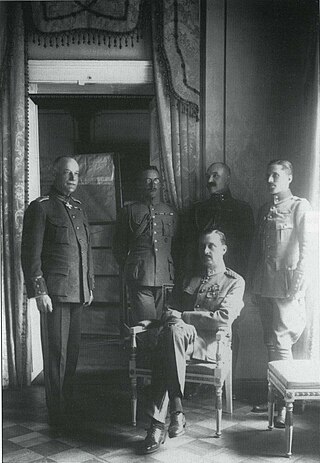Related Research Articles
Regimental sergeant major (RSM) is an appointment that may be held by a warrant officer (WO) in the British Army, the Royal Marines, and the armies of many other Commonwealth and former Commonwealth nations. It is also an actual rank in the Irish Defence Forces, and formerly in the British Army, Royal Marines and United States Army. Only one warrant officer holds the appointment of RSM in any regiment or battalion, making them the senior warrant officer; in a unit with more than one top-ranked WO, the RSM is considered to be first amongst equals". The RSM is primarily responsible for assisting their commander in maintaining standards and discipline amongst the non-commissioned members and acts as a parental figure to their subordinates, sometimes referred to by the mantra "Drill, Dress and Discipline".
Sergeant is a rank in use by the armed forces of many countries. It is also a police rank in some police services. The alternative spelling, serjeant, is used in The Rifles and other units that draw their heritage from the British light infantry. Its origin is the Latin serviens, 'one who serves', through the French term sergeant.
Staff sergeant is a rank of non-commissioned officer used in the armed forces of many countries. It is also a police rank in some police services.
Sergeant major is a senior non-commissioned rank or appointment in many militaries around the world.

Adjutant is a military appointment given to an officer who assists the commanding officer with unit administration, mostly the management of human resources in an army unit. The term adjudant is used in French-speaking armed forces as a non-commissioned officer rank similar to a staff sergeant or warrant officer but is not equivalent to the role or appointment of an adjutant.

Colour sergeant is a rank of non-commissioned officer found in several armies and marine corps.
Havildar or havaldar is a rank in the Indian, Pakistani and Nepalese armies, equivalent to sergeant. It is not used in cavalry units, where the equivalent is daffadar.
Company quartermaster sergeant is a military rank or appointment.

"Other ranks" is the term used to refer to all ranks below officers in the British Army and the Royal Marines. It includes warrant officers, non-commissioned officers ("NCOs") and ordinary soldiers with the rank of private or regimental equivalent. Officers may, in speaking, distinguish themselves from those "in the ranks".
Regimental quartermaster sergeant (RQMS) is a military rank in some militaries, and an appointment in others.

The company sergeant major (CSM) is the senior non-commissioned soldier of a company in the armies of many Commonwealth countries, responsible for administration, standards and discipline. In combat, their prime responsibility is the supply of ammunition to the company. They also oversee the distribution of other supplies, such as water or food, although that responsibility is mainly that of the company quartermaster sergeant (CQMS), and evacuating the wounded and collecting prisoners of war.

Quartermaster is a military term, the meaning of which depends on the country and service. In land armies, a quartermaster is generally a relatively senior soldier who supervises stores or barracks and distributes supplies and provisions. In many navies, a quartermaster is an officer with particular responsibility for steering and signals. The seaman is a non-commissioned officer rank; in some others, it is not a rank but a role related to navigation.
Subedar-major is the senior-most rank of junior commissioned officer in the Indian and Pakistani Armies, formerly known as the Viceroy's commissioned officer in the British Indian Army.
The term used in the Royal Air Force (RAF) to refer to all ranks below commissioned officer level is other ranks (ORs). It includes warrant officers (WOs), non-commissioned officers (NCOs) and airmen.
Master warrant officer (MWO) is a senior military rank in the Bangladesh Armed Forces, the Canadian Forces, Singapore Armed Forces, the South African National Defence Force and the Israel Defense Forces.

A bandmaster is the leader and conductor of a band, usually a concert band, military band, brass band or a marching band.
Quartermaster sergeant (QMS) is a class of rank or appointment in some armed forces, especially those of the United Kingdom and the Commonwealth, and formerly also in the United States.
First sergeant is typically a senior non-commissioned officer rank, used in many countries.

A warrant officer (WO) in the British Armed Forces is a member of the highest-ranking group of non-commissioned ranks, holding the King's Warrant, which is signed by the Secretary of State for Defence.
References
- ↑ Queens Regulations for The Army. Great Britain Ministry of Defence. 1975. ISBN 0117718793.